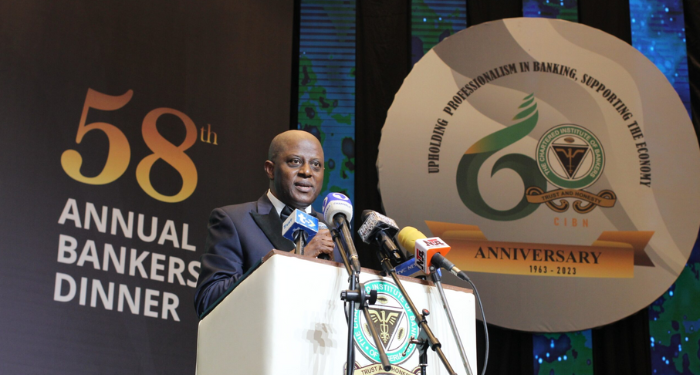The Central Bank of Nigeria (CBN) has released guidelines for virtual assets in a move that will allow virtual assets service providers (VASPs) which include cryptocurrencies and crypto assets organizations to now open accounts with Nigerian banks.
The regulation titled GUIDELINES ON OPERATIONS OF BANK ACCOUNTS FOR VIRTUAL ASSETS SERVICE PROVIDERS (VASPs) is coming two years after the apex bank had restricted banks and other financial institutions from operating accounts for cryptocurrency service providers.
The guidelines, which were issued to all banks and other financial institutions via a circular dated Friday, December 22, 2023, stipulate conditions for opening an account by virtual assets providers.
The CBN, however, emphasized that banks and other financial institutions are still prohibited from holding, trading, and/or transacting in virtual currencies on their account.
It defined Virtual Assets as follows;
- “Virtual Asset means a digital representation of value that can be transferred, digitally traded, and can be used for payment or investment purposes. It shall not include digital representations of fiat currencies, securities and other financial assets that are already covered elsewhere in the FATE recommendations.”
This suggests Cryptocurrencies such as Bitcoin, which are not digital representations of fiat currencies or traditional financial assets, fall under a different category.
They are not covered by the traditional financial regulations that apply to fiat currencies and securities.
The apex bank said the issuance of the guidelines was prompted by the current global trends pointing to the need to regulate the activities of virtual VASPs.
The guidelines
Under the guidelines, the CBN said the banks and OFIs are permitted to undertake the following activities in their operations of accounts for VASPs:
- Opening of designated accounts;
- Provide designated settlement accounts and settlement services;
- Act as channels for FX flows and trade; and
- Any other activity that may be permitted by the CBN from time to time.
“From the commencement of these Regulations, Fl shall not open or permit the operation of any account by any person or entity to conduct the business of virtual/digital assets unless that account is designated for that purpose and opened in line with the requirement of these Guidelines,” the apex bank stated.
As part of the conditions to open an account for a VASP, the Guidelines stipulate that a designated account can only be opened with the approval of senior management of the financial institution.
“Any application for opening a designated account by a company providing virtual/digital services under these Guidelines shall be supported by the following documents:
- Evidence of a valid licence issued by the Securities and Exchange Commission (SEC) for the entity to engage in the business of VASP/DAX/DAOP.
- Certified true copy of the memorandum and article of association.
- Certified true copy Form CAC2-Statement of share capital and return of allotment of shares.
- Certified true copy Form CAC 2.1 particulars of secretary.
- Certified true copy Form CAC 3- notice of registered address.
- Certified true copy of Form CAC 7-Particulars of Directors
- Verifiable registered address of the company
- Copy of Certificate of Capital Importation (CCI) (where applicable)
- Valid means of identification of all the directors, principal officers and beneficial owners of the company.
- BVN of all the directors, principal officers and beneficial owners of the company.
- Home address of all the directors, principal offices and beneficial owners of the company.”
The Central Bank of Nigeria (CBN) issued a circular in February 2021, imposing restrictions on banks and other financial institutions from managing accounts belonging to cryptocurrency service providers.
This action was taken in light of the risks and vulnerabilities associated with money laundering and terrorism financing (ML/TF) prevalent in the operations of such providers, compounded by the lack of regulatory frameworks and consumer protection measures.
However, it has been noted that the most recent Guidelines take precedence over the circular from 2021.
What this means
The new guidelines signal a move towards regulating cryptocurrency service providers. This means that these businesses will need to follow specific rules set by the Nigerian authorities, which could include measures to prevent money laundering and terrorism financing.
- By recognizing virtual asset service providers (VASPs) as part of the financial system, the government is providing more legitimacy to cryptocurrency businesses.
- This formal recognition could pave the way for more structured and legally acknowledged operations.
- The broader context of the regulation indicates that while there is a regulatory framework being developed for cryptocurrencies, which includes Bitcoin and other similar digital assets, it aims to establish clear rules for their operation to prevent misuse for money laundering and financing terrorism.
- This does not necessarily mean that Bitcoin and other cryptocurrencies are disallowed; rather, it means they are subject to regulation to ensure they are used in a compliant and legally acceptable manner.
- The circular suggests that cryptocurrency service providers are to be regulated, which means that while they can operate, they must follow strict rules and guidelines set by the Nigerian authorities.
- Banks and financial institutions are still prohibited from holding, trading, or transacting in cryptocurrencies directly, but the guidelines provide a way for these institutions to engage with cryptocurrency service providers under certain regulatory conditions.
FATF’s guidelines
The CBN’s guidelines take a cue from the 2019 recommendations of the Financial Action Task Force (FATF), an independent inter-governmental body that develops and promotes policies to protect the global financial system against threats such as money laundering and terrorist financing,
- At the end of its Plenary Week in Orlando, Florida on June 22, 2019, the FATF announced that it had adopted and issued “an Interpretive Note to Recommendation 15 on New Technologies,” which clarifies the amendments to the international standards relating to crypto assets and describes how countries must comply with relevant recommendations.
- The body advised countries to assess and mitigate the risks associated with virtual asset activities and service providers and implement sanctions and other enforcement measures when service providers fail to comply with their AML/CFT obligations.
They are also required to “license or register service providers and subject them to supervision or monitoring by competent national authorities,” and “will not be permitted to rely on a self-regulatory body for supervision or monitoring.”





















Who owns FMDQ indirectly or directly